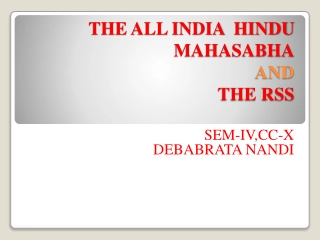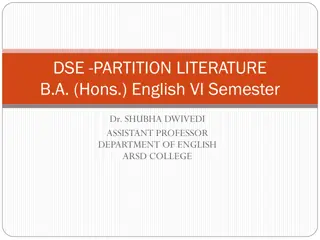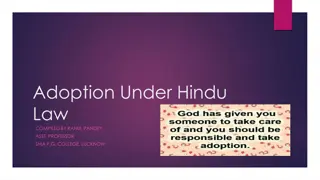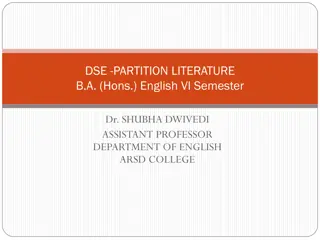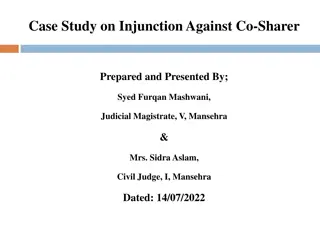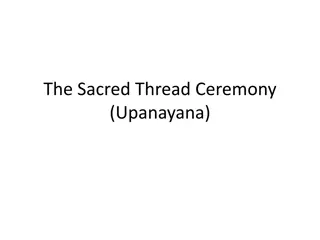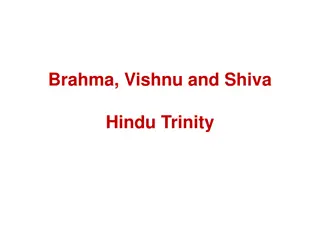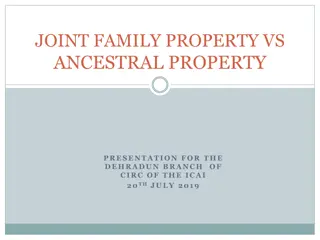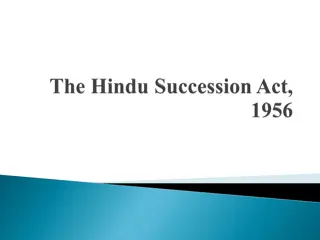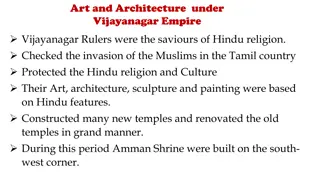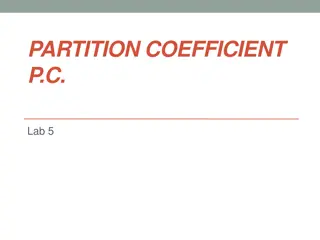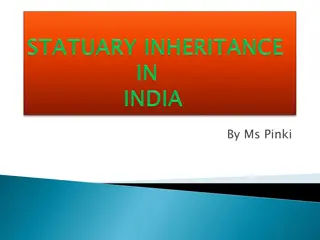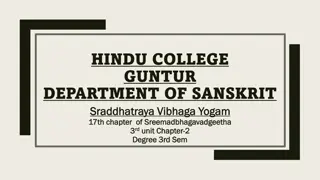Understanding Hindu Joint Family and Partition Laws in India
In India, there is a presumption that every Hindu family is joint. The Hindu joint family system is unique to Hindu society, consisting of the common ancestor, descendants, wives, and unmarried daughters. This article explores the composition of joint families, corporate personality, Hindu Undivided Family for taxation purposes, and the presumption of jointness in Hindu families.
Download Presentation

Please find below an Image/Link to download the presentation.
The content on the website is provided AS IS for your information and personal use only. It may not be sold, licensed, or shared on other websites without obtaining consent from the author. Download presentation by click this link. If you encounter any issues during the download, it is possible that the publisher has removed the file from their server.
E N D
Presentation Transcript
Hindu Law- Dr. Anita M. J
Hindu Joint Family And Partition
INTRODUCTION In India, there is a presumption that every Hindu Family is joint. The joint and undivided family is the normal condition of Hindu society. An undivided Hindu family is joint not only in estate but in food and worship.. However, the possession of joint property is not a requisite for constitution of joint family. Hindus get a joint family status by birth and the joint family property is only an adjunct of joint family.
Hindu Joint Family 1. Composition of joint family: The Hindu Joint Family is peculiar to Hindu society only. It consists of the common ancestor and all his lineal descendants upto any generation together with the wife or wives (or widows) and unmarried daughters of the common ancestor and of the lineal male descendants. It has to be clearly understood that the existence of the common ancestor is necessary for bringing a joint family into existence; for its continuance common ancestor is not a necessity. The death of the common ancestor does not mean that the joint family will come to an end.
2.Corporate personality and composite family: A Hindu joint family is not a corporation. A Hindu joint family has no legal entity distinct and separate from that of the members who constitute it. It is not a juristic person either. Hindu family is a unit and in all affairs it is represented by its karta or head. Anchuru Vs. Gurijala ,1961 A.P 434 Chotelal Vs. Jhandelal,1972
3.Hindu Undivided Family: For the purposes of assessment of tax, the revenue statutes use the expression, Hindu Undivided Family . This appears to be slightly different from the definition of a Hindu Joint family. For instance, for the purpose of revenue statutes, there can be an undivided family consisting of a man, his wife and daughters oe even of two widows of a sole surviving coparcener. A single male or female cannot make a Hindu joint family even if the assets are purely ancestral. Gowli Vs. Commisoner of income tax ,Mysore ,1966
4.Presumption of jointness: This has been an accepted proposition that every Hindu family is presumed to be joint family. The undivided joint family is the normal characterstic of a hindu family. Presumption is that the members of the family are living in a state of jointness, unless contrary is proved. 1.Jagannath Vs. Lakhannath,1981 2.Kethaperumal Vs. Rajendra,1959
5.No presumption that joint family holds joint property: There is no presumption that joint family possesses joint property. It has not been seen that normally a Hindu joint family is joint in estate, but there is no presumption that the properties held by a member of joint family properties. Daughter has also been made a coparcener by virtue of section 6(1) of the Hindu Succession ( Amendment ) Act, 2005. Selyaraj Vs. Radhakrishna,1976
6.Coparcenary: Coparcenery is a narrow body of persons within a joint family, and consists of the father, son, son s son sand son s son s son. Like joint family, to begin with, it consists of the father and his three male lineal descendants; in its continuance, the existence of the father-son relationship is not necessary. Thus, a coparcenery can consist of grand-father and grand-son, of brothers, of uncle and nephew and so on. Ananda Vs. Suman,1988 cal 375
A A A Dies Corparceners (Limit of Four degrees.) B C B C D Corparceners (Limit of Four degrees.) D E E F F Not Corparceners Not Corparceners G G H H
7.Incidents of coparcenership : The incidents of coparcenership are: A coparcenor has an interest by birth in the joint family property, though until partition takes place, this is an unpredictable and fluctuating interest which may be enlarged by deaths and diminished by births in the family; every coparcener has the right to be in joint possession and enjoyment of joint family property- both these are expressed by saying that there is community of interest and unity of possession. Every coparcenor has a right to be maintained including a right of marriage expenses being defrayed out of joint family funds. N.jayalakshmi Vs. R. Gopala
8.Unpredictable and fluctuating interest : The most remarkable feature of interest by birth is that the interest by which a coparcenor acquires by birth is not a specified or fixed interest. At no time before partition can it be predicted that he is entitled to so much share n the family property. Bhagwan dayal Vs. Reoti devi,1962 sc 287
9.Right of maintenance: Every coparcener and every other member of the joint family has a right of maintenance out of the joint family property. The right of maintenance subsists through the life of the member so long as family remains joint. Female members and other male members who do not get a share on partition, either because they have no right, such as an unmarried daughter or because they are disqualified from getting a share, such as an idiot or lunatic coparcener, are entitled to maintenance even after partition. Unmarried daughters, have a right to be married out of the joint family funds.
10.Illegitimate son as a coparcenor: Hindu law has never considered ab illegitimate child as a filis nullius. An illegitimate son, particularly the dasiputra has always been regarded as a a member of his putative father s joint family and as such has a right to be maintained out of the joint family funds during his entire life. However, he has not been considered as a coparcenor. Gur Naraindas Vs. Gur Tahaldas ,1952 SC 225
11.Corparcenor between a sane and insane person: There can be a coparcenary between a sane and insane person. A Corparcenor gets his right in the Corparcenory property by birth and there is nothing in hindu law which shows that such a right is irrevocably extinguished on a supervening insanity. Under hindu law, an insane Corparcenor has not right to claim partition has not right to a share if partition takes place, but this does not make him cease to be a Corparcenor. Amrithamma Vs. Vallimayil,1942,mad 693
12.Corparcenory between a father and sons born of civil marriage: If a Hindu performs a marriage under the Special Marriage Act, 1954, with a non-Hindu, his interest in the joint family property is severed. But does it mean that there cannot be a Corparcenery between such a Hindu and a son born to him out of the marriage. A Corparcenery will come into existence between him and his son provided his son is a Hindu. R.Shridharan Vs. The commissioner of Wealth tax,1970 Mad 249
13.Corparcenory within the coparcenery: It is possible that separate Corparcenories may exist within a corparcenory. The Supreme Court considered in Bhagan v Reoti S.C 287 Where it was observed that: Hindu law recognizes only the entire joint family or one or more branches of that family as a corporate unit or units and that the property acquired by that unit in the manner recognized by law would be considered as joint family property. Coparcenary is a creature of Hindu law. The law also recognizes a branch of the family as a subordinate corporate body.
14.No female can be a corparcenor: In Mitakashara coparcenary, no female except a daughter can be its member, though they are members of the joint family. It means no female except daughter has any interest by birth in the joint family property. She has no right of survivorship or partition, though if a partition takes place, certain females are entitled to a share. Widow of a son is not a coparcener. This is new subject to Section 6(1) of the Hindu Succession (Amendment) Act,2005 1.Subash Eknathrao Vs. Pragyabhai Manohar Biradar, 2008 Bom. 46. 2. Lakshmi Vs. Krishnavenanna ,1965 S.C 828
Features of Coparcenery: 1.Coparcenery is a creation of law and not by the fact of parties. Only, in case of adoption, the adopted son becomes a Coparcener foe the properties of the adoptive father. 2. a female can be a member of coparcenary. 3.Unity of ownership is the essence of a Coparcenery. When the property is undivided, share in the property is unpredictable. The interest of a member in the family enlarges by deaths and diminishes by births in the family. There is community of interest and unity of possession between all the members of the family. The Coparcenery property is held in collective ownership by all the coparceners in a quasi corporate capacity. 4.There may be maintenance holders without being Coparceners in the common estate. 5.f the manager or other members in the family make invalid alienations, then the Coparceners have right to invalidate them. 6.The Coparcener is a corporate entity and in all transactions the Karta represents.
Rights of Coparceners: The following are the rights of a Coparcener: 1.Every Coparcener is entitled to community of interest and unity of possession of Coparcener s property along with the other Coparceners. 2.A Coparcener s share gets defined only when a partition takes place. 3.Every Coparcener is entitled to joint possession of the coparcenery property and also its enjoyment. In case, a coparcener is not allowed for joint possession or enjoyment of property, then he can enforce his rights by a civil suit. 4.Every coparcener is entitled to maintenance out of income of the coparcenery property. 5.Every coparcener is entitled for partition of the coparcenery property. 6.Sole surviving coparcener entitled to all property.
Karta: The karta is usually a person who is the senior most male member in a Hindu Joint Family. He is the head of the family and exercises administrative control of all the coparcenery property including even charitable properties. He represents the family in all contracts. After his death, the eldest son becomes the karta. A senior may waive his right to the status of Kartha and may hand it over to the next senior members. Generally, woman cannot be a coparcener and hence she cannot be the manager of a joint family. A minor may become a karta, but he must act through a legal guardian, till he becomes a major. Generally his mother is such a legal guardian. The karta is in the position of confidence, for the proper management of the property. He is not a trustee because he has got a co-ownership in the property. Further a karta is liable to give accounts for all his transactions, whether past or present. If other members of the family participate in the management of the family business, then it may be said that there can be more than one manager and their acts are binding on the other members.
Powers of Karta: The powers of karta are governed by custom and case laws, there is no statutory provision defining the powers of the karta. The following are some of his important powers: 1.The karta has control over the income and expenses. The expenses should be for family purposes. 2.On partition, the karta need not account for his past dealings with the family property unless he is alleged of misappropriation of the family estate. 3.The karta can alienate the coparcenery properties for the benefit of the estate. The benefit of estate includes the protection of property, protection from injuries, defence against hostile claims, etc. 4.If the alienation is not justified by legal necessity or benefit, the alienation is set aside. Sometimes, in such cases, equitable relief is given to the alienee, if the alienation is for partial benefit. 5.The karta can gift away the properties. Thus gifts to temples, charitable purposes, gift to female members at the time of marriage are instances of gift within reasonable limit and hence valid.
6.A karta can incur debts by raising loans. However, there must be legal necessity or benefit of the estate. The lender need not look into the application of the borrowed money. 7.Debts can be incurred by the karta on the ground of legal necessity and benefit of the state, or for the family business. For such debts coparceners are liable. 8.The karta can commence a new business along with the original trade of the joint family, if it is advantageous to the family. 9.The karta can execute promissory notes, acknowledge debts in the name of the joint family, but not in the individual capacity of karta. If he does so, then he is personally liable. 10.For discharging the old or antecedent debts, the karta can alienate the coparcenery property. Such debts lie within the scope of the doctrine of pious obligation and hence the sons are liable for the transactions of the father. 11.Equities on setting aside alienation: Sometimes, when the court holds that the alienation is not for legal necessity or benefit of the estate, and sets aside the alienation, some equitable relief is given to the alienee. 12.Karta has a power to refer disputes relating to joint family property to arbitration. The members and minors are bound by the reference and award made by such arbitration. Such disputes may be between family members or family members within outsiders.
Hanuman Persuad Vs. Musummat Babooee: A widow mother mortgaged the property of her minor son describing her as the owner of the property. On attaining majority, the son sued the mortgagee to set aside the mortgage on the ground that his mother had no right to mortgage was not valid as the mother had wrongly described herself as the owner while in fact she was not. However, Privy council held that though the mother had described herself as the owner she had acted on behalf of the son without dishonest intention and remanded the case to the lower Court for fresh disposal. The Privy Council laid down that the alienatory power on behalf of the minor can be exercised for legal necessity or for the benefit of the minor s estate. Such powers can be exercised for the benefit of the minor. Srinath Vs. Jaganath: The coparcenery property was sold for Rs. 6000/- but the purchaser failed to enquire into the legal necessity for the sale. There has been a debt of Rs. 3200/- which was discharged by the coparcener. The Court set aside the sale, and since the amount of Rs. 3200/- had been actually paid for paying off debts, the sale would be conditional on the plaintiff refunding Rs. 3200/- to the purchaser.
Cases: 1.Shreeama Vs. Krishnavenan,1957 2.Ram Vs. Khira 1971 Pat 286 3.Mudit Vs. Rangal ,1902 4.Gangoli Vs. H.K Channappa,1983, Karnataka 222 5.Subbaiah Vs. Union Of India (1973)Mys 6.Pendala Vs. Pendala (1972) 7.Amrit Vs. Suresh 1970 S.C
PARTITION Partition means bringing the joint status to an end. On partition, joint family ceases to be joint, and the nuclear families or different families come into existence. SUBJECT MATTER OF PARTITION As a general rule ,the entire joint family property Is ,and the separate property of coparceners is not ,subject to partition. A plaintiff seeking partition must prove the existence of joint family property. 1.Murugesa VS. M. Sadayappa ,1997 Mad 4
PROPERTIES WHICH ARE NOT CAPAPBLE OF DIVISION BY THEIR VERY NATURE Although the general rule is that the entire joint family property is available for partition ,yet there may be certain species of joint family property which by their very nature, incapable of division, then such properties cannot be divided. The Partition Act : Section 2 of the partition act runs: whenever in any suit for partition in which it appears to the court by reason of nature of the property to which suit relates ,or of the number of the shareholders therein or for any other special circumstance, a division of the property cannot reasonably or conveniently be made and the sale of the property and the distribution of the proceeds would be more beneficial for all shareholders, court may, if it thinks fit, on the request of any of such shareholders
interested individually or collectively to the extent of one moiety or upward , direct a sale of the property and a distribution of the proceeds. Family Shrines, Temples and idols : The family Shrines ,Temples and idols constitute such spicies of joint family property which can neither be divided nor sold. The same may apply to certain sentimental and rare items . 1.Damodar Vs. Utaramma, 1893 17 Bom.271
PERSONS WHO HAVE A RIGHT TO PARTITION AND WHO ARE ENTITLED TO A SHARE ON PARTITION Father : The father has not merely a right to partition between himself and his sons but he has also the power to effect partition among the sons inter se. Son, grandson and greatgrand son: Under the Dayabhaga school, there is no coparcenery consisting of the father and his legal male descendants and therefore , sons, grand sons or great-grandsons have no right to partition. On the other hand ,under the Mitakshara school, son, son s son and son s son s son have aright to partition.
Son conceived at the time of partition but born after partition : The texts lay down that if the pregnancy is known, the partition should be postponed till the child is born. But if the coparceners do not agree to this then a equal share of a son should be reserved for the child in the womb. Adopted son : Adopted son has the same right of partition and he is entitled to the same share as if he was a natural born son.
MODES OF PARTITION It is not necessary under Hindu law that the partition should be executed by a registered instrument. Even a family compromise between the coparceners would be sufficient to effect a partition and by virtue of that they become entitled to individual share and use thereof. According to Supreme Court, partition may be partial or total. Partition could be partial with respect to the members of joint family or joint family property. When a partition takes place, the presumption is about the total partition. But where some members contend that the partition was partial with respect to members or property, onus is on them to prove it.
1.Partition by Mere Declaration: Partition under the Mitakshara law is severance of joint status and as such it is a matter of individual volition. An unequivocal indication of desire by single member of joint family to separate is sufficient to effect a partition. The filing of a suit for partition is a clear expression of such an intention. The oral or written communications by a coparcener could be enough to sever the joint status but the communication could be withdrawn with the consent of other coparceners and with its withdrawal partition would not take place. In Raghvamma Vs. Chenchemma, the Supreme Court laid down that it is settled law that a member of joint Hindu family can bring about a separation in status by a definite declaration of his intention to separate himself from the family and enjoy his share in severalty. Severance in status is brought about by unilateral exercise of discretion.
2.Partition by Will: Partition may be effected by a coparcener by making a will containing a clear and unequivocal intimation to the other coparceners of his desire to sever himself from joint family or containing an assertion of his right to separate. In Potti Laxmi Vs. Potti Krishnamma, the Supreme Court observed, Where there is nothing in the will executed by a member of Hindu coparcenery to unmistakably show that the intention of the testator was to separate from the joint family, the will does not effect severance of status.
3.Partition by Agreement: An unequivocal expression of the desire to use the joint family property in certain defined shares may lead the members of joint family to enter an agreement to effect a partition. The two ideas, the severance of joint status and a de facto division of property are distinct. As partition under the Mitakshara law is effected on severance of joint status, the allotment of shares may be done later. Once the members of joint family or heads of different branches of the coparcenery agree to specification of shares, the same can be treated to result in severance of joint status though the division by metes and bounds may take place later on. In Approver v. Ram Subba Iyer the Privy Council had observed that no coparcener can claim any defined share in the joint family property in a joint family, but where the coparceners enter into an agreement to the effect that every member will have a specific and defined share in future, the joint status is affected and every coparcener acquires a right to separate his specific share and use the same to exclusion of others.
4.Partition by Arbitration: An agreement between the members of joint family whereby they appoint an arbitrator to arbitrate and divide the property, operates as a partition from the date thereof. The mere fact that no award has been made is no evidence of a renunciation of the intention to separate. Where all the coparceners jointly have referred the matter relating to the partition of their shares in the joint family to an arbitrator, this very fact expressly indicates their intention to separate from joint status. In such cases even if award is not given, their intention is not dissipated. 5.Partition by Suit: Mere institution of a partition suit disrupts the joint status and a severance of joint status immediately takes place. A decree may be necessary for working out the resultant severance and for allotting definite shares but the status of a plaintiff as separate in estate is brought about on his assertion of his right to separate whether he obtains a consequential judgment or not.
So even if such suit was to be dismissed, that would not affect the division in status which must be held to have taken place when the action was instituted. Ordinarily a partition is affected by instituting a suit to this effect. In case of a suit for partition in joint status, father s consent to the suit for partition is no longer necessary. The son is fully eligible to file a suit for partition even during the lifetime of father. When the plaintiff files a suit for partition the share which he received in the earlier partition would not be free from charges and liabilities. If the creditors have obtained the decree against the joint family property, then even that share of the plaintiff which he did not receive, would also be liable in the same manner as that of the other coparceners.











